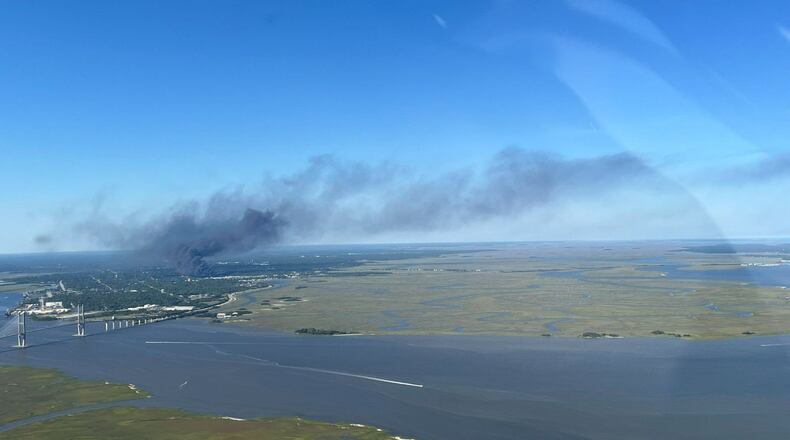Authorities are investigating the cause and potential environmental impacts of a massive fire that occurred at a chemical plant in Brunswick on Saturday, which triggered evacuation orders and left some residents leery of returning home, even after officials said it was safe to do so.
Fire investigators were at the plant Sunday but still had not found a cause for the fire. State records show the plant has a history of air and wastewater violations dating back to 2012, including over $200,000 in fines.
The blaze erupted early Saturday morning at the plant, run by Pinova, Inc. in the 2800 block of Cook Street near downtown Brunswick. Company spokesman Ron Kurtz said the fire occurred in a part of the factory that produces terpene resins, which are used in adhesives, construction materials, fragrances, as well as personal care and household items.
Just before 10 a.m. Saturday, Glynn County authorities said the fire was contained and that there was no immediate concern for public safety. A few hours later, that changed as the fire reignited.
Around 3 p.m., officials issued a shelter in place order for areas within a half mile of the plant, but soon expanded the advisory to include a one mile radius and northern parts of St. Simons Island.
Zack Lyde, a local preacher and community activist who lives a block from the Pinova plant, said he returned home around the time the fire reignited and saw thick, black smoke billowing into the sky above Brunswick and nearby St. Simons Island. He left and headed to his daughter’s home.
“I didn’t wait for them to issue an evacuation order,” Lyde said. “It was terrifying.”
Firefighters from several coastal Georgia jurisdictions and as far south as Jacksonville, Florida joined the effort.
Finally, after a Georgia Forestry Commission plane dropped flame retardant on the blaze, Glynn County officials said the fire was out and lifted the local evacuation orders shortly after 10 p.m. Saturday. On Sunday morning, the city of Brunswick’s state of emergency was also rescinded.
Katie Baasen, the director of communications for Glynn County, said an initial cause has not been determined, but said the state fire marshal was at the plant Sunday and is leading the investigation. Baasen added that the federal Environmental Protection Agency (EPA) was on site Saturday conducting air monitoring and said the agency did not capture any readings that raised concern for public health.
Ron Kurtz, the Pinova spokesman, thanked state and local authorities for extinguishing the fire and said the company has “deployed a large number of internal and external experts to conduct a full investigation.” He did not provide a timeline for the results of that inquiry to be released.
The Pinova plant where the fire occurred has a history of environmental noncompliance.
State records show the facility has been fined more than $278,000 since 2012 by environmental regulators at the Georgia Environmental Protection Division (EPD) for a host of air quality and wastewater violations, including failing to properly monitor and record pollutant emission levels.
Georgia EPD did not immediately respond to a request for comment.
Saturday’s inferno comes just months after another blaze at a different chemical facility near Brunswick triggered evacuation orders. Baasen said she was not aware of any inquiries into why two large fires have erupted in the area in quick succession, but added that Glynn County plans to consult with local manufacturers to “see what can be done to be more preventative for our good and their good.”
Brunswick, a majority Black city where nearly one-third of residents live below the poverty line, has a history of pollution stretching back decades.
Georgia is home to 18 locations that are on or proposed for listing by the EPA as a Superfund, a designation reserved for the country’s most polluted sites that require long-term cleanups. Brunswick is surrounded by four of them — more than any other city in the state.
That legacy has led to mistrust of officials from residents like Lyde, who is 84 and has lived in Brunswick most of his life. He said he does not feel comfortable returning home and plans to stay at his daughter’s house indefinitely.
“It’s very depressing,” he said. “We’ve got to have a very serious response from the entire spectrum of government.”
Susan Inman, a coastal advocate with the nonprofit environmental protection group One Hundred Miles, thanked emergency responders, but lamented that the area’s pollution continues to burden residents.
“As a waterfront city surrounded by majestic marshes, Brunswick is a city that should be thriving,” Inman said. “Yet we are saddled with a legacy of irresponsible industrial development and contamination that has put us in a hole that is very difficult to dig out from.”
About the Author
Keep Reading
The Latest
Featured




